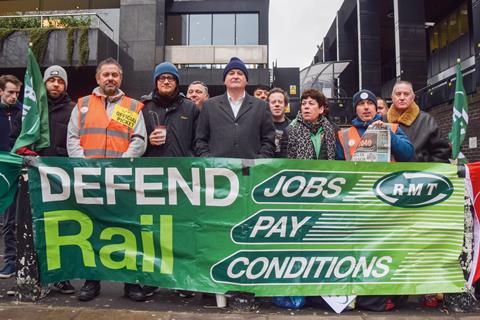A Brexit bonfire of employment laws has been narrowly averted for now. But battle has been joined on the streets and in the courts over far-reaching new legislation designed to undermine and curtail strikes
Until a few weeks ago, employment lawyers – and the businesses and staff for whom they act – were standing on the edge of a very tall cliff. They nervously chewed their lips in the knowledge that, at the stroke of midnight on 31 December, all European-derived legislation – which includes fundamental employment laws – were due to be hurled off the edge to smash into a thousand pieces at the bottom, with no apparent plan to replace them. It seemed inconceivable that the government would allow this to happen, but as 2023 ticked on, nothing was done to prevent it. So on 10 May, the complete change in approach outlined by business secretary Kemi Badenoch in a Telegraph article and a written statement to parliament was greeted with relief by employment lawyers. The many significant employment laws that have their origins in the EU are now safe for the time being.

The cliff edge had been created by a ‘sunset clause’ in the Retained EU Law (Revocation and Reform) Bill that would have seen all EU laws cease to apply at the end of this year. This was originally billed as around 4,000 laws that would be going up in smoke atop a blistering Brexit bonfire. But as the deadline drew nearer, it became increasingly apparent that this was wholly unworkable and potentially very damaging. Instead, Badenoch has opted to ditch the sunset clause. The government has provided a list of only around 600 EU laws to be revoked by the original deadline, more than half of which relate to the environment. The fate of other EU laws will then be considered more carefully.
'What was billed as a bonfire of EU law has ended up as a sparkler, which was promptly doused with water when the government announced it would abandon the sunset clause'
Beverley Sunderland, Crossland Employment Solicitors
This pragmatic approach may have been welcomed by most lawyers but it was met with fury by Conservative arch-Brexiteers, who had been busily practising their chants ready to dance around that particular bonfire. When Badenoch was called to parliament to answer an urgent question on the issue, European Research Group chair Mark Francois demanded to know why government had performed a ‘massive climbdown’ on a bill with such strong backbench support. Jacob Rees-Mogg, who was responsible for the sunset clause, also asked if ‘civil service idleness’ or ‘lack of ministerial drive’ were the reasons behind the move.
Beverley Sunderland, managing director of Crossland Employment Solicitors, notes: ‘What was billed as a bonfire of EU law has ended up as a sparkler, which was promptly doused with water when the government announced it would abandon the sunset clause.’
Fiddling round the edges
Along with the new approach to existing EU legislation, the government published a policy paper this month. Smarter regulation to grow the economy sets out some fairly unambitious changes.
In relation to the Working Time Regulations, the government says it wants to cut red tape for businesses by removing ‘time-consuming and disproportionate’ obligations to keep working-hour records for almost all members of the workforce. It also wants to reduce the administrative burden and complexity of calculating holiday pay.
Stewarts partner Charlie Thompson notes that the current rules are ‘fiendishly complicated’. So ‘something which makes the system easier to navigate may tentatively be welcomed by employers and employees alike.’
But Sunderland describes the changes put forward as ‘fiddling round the edges’, particularly as few employers currently keep records of working hours anyway.
The policy paper also seeks to reduce the burden on businesses by ‘simplifying’ the Transfer of Undertakings (Protection of Employment) (TUPE) Regulations. Under the current rules, businesses cannot consult employees directly where no employee representatives are in place, meaning they must elect new employee representatives. The government proposes removing this requirement for businesses with fewer than 50 people and transfers affecting fewer than 10 employees, allowing businesses to consult directly with the affected employees instead.
Given that there is already a TUPE exemption for microbusinesses with fewer than 10 employees, the effect of this measure seems likely to be limited.
The third change proposed in the policy paper is perhaps more controversial. With the stated aim of ‘boosting competition and innovation’, the government wants to limit the lifespan of non-compete clauses in employment contracts. These seek to restrict someone’s ability to go and work for a competitor or set up their own competing business. Government argues that such clauses have become ‘a default part of too many employment contracts’ and can stop employees from looking for better-paid roles. So it plans to legislate, ‘when parliamentary time allows’, to limit such clauses to three months. The consultation adds that ‘limiting non-compete clauses will not interfere with the ability of employers to use (paid) notice periods or gardening leave, or to use non-solicitation clauses. These reforms will not cut across arrangements on confidentiality clauses’.
Sunderland argues that this proposal ‘overlooks the main issue’. She says: ‘The only times these kinds of clause are likely to be enforceable are if the employee concerned has highly confidential information about the business they are leaving, and the length of the restriction is based on how long the information will remain confidential for.
‘The reason for this is that once an employee moves employer, then the cat might slip out of the bag accidentally. It cannot be put in again, and there is no way to police it. Although employers can start to use longer notice periods with garden leave, these can be challenged in the same way as restrictions can. The argument will be that if you cannot prevent an employee from joining a competitor for more than three months, then why should they be allowed to be placed in the garden for longer?’
For Sunderland, it is a strange priority for the government to have chosen. ‘This change smacks of those in or connected to government wishing to be free of restrictions, rather than a general desire to help businesses,’ she says.
Sophie Vanhegan, partner of GQ|Littler, says: ‘At present the courts have taken a very subjective view on non-compete clauses, allowing some lengthy clauses and overturning other short non-compete clauses. That has made the enforceability of those clauses a bit of a lottery…
‘There’ve been several efforts to change the law on non-compete clauses over the past decade, but they’ve never made much progress. As this initiative will require primary legislation, it’s doubtful whether the government will find time to get this through parliament in the near term. That means that companies won’t need to rush to rewrite existing employment contracts.’
A snowflakes’ charter?
Employees are well protected in law from harassment by bosses or colleagues. But what about when the perpetrator is a customer or supplier? For the past decade, there has been a gap in protection where workers are harassed by third parties. The Worker Protection (Amendment of Equality Act 2010) Bill – a private member’s bill supported by government currently going through the Lords – was intended to close that gap, but its future is in doubt.
Protection against harassment by third parties was previously provided under the Equality Act, but the government quietly repealed the relevant section in 2013 because it was considered unworkable. The new bill would put a positive duty on employers to take ‘reasonable steps’ to prevent third-party harassment. In practice, this probably means having the right policies and procedures in place, with regular training.
Unfortunately, the bill has not proved universally popular. ‘The hardened critics have labelled it a “snowflakes’ charter”, or “protection from being offended”,’ explains Stewarts partner Charlie Thompson. As a result, the bill has been watered down so that employers will not face liability for workplace harassment (other than sexual harassment) where it stems from a conversation in which someone has expressed an opinion on a political, social, moral or religious matter, and the comments were not directly aimed at the employee. The opinion in question must not be ‘indecent or grossly offensive’.
Beverley Sunderland, managing director of Crossland Employment Solicitors, explains: ‘One of the problems [the government] has come up against is that the freedom of speech lobbyists have got hold of this and said, “Hang on a minute, people need to be able to express their own views, that is a fundamental right in the UK”.’ Tensions might arise, for example, where a third party is expressing a religious view that marriage should be a union between a man and a woman, which others might find offensive. ‘So the government has been trying to carve out exceptions,’ says Sunderland, ‘but I think they’re slowly realising that doing that is going to almost render the legislation inoperable. A general view is forming that this is not going to make it to the statute book; and press reports suggest that government support for it is waning.’

Striking effect
While the reform proposals above are fairly low-impact, the government is also in the throes of bringing in a much more important piece of employment-related legislation – the Strikes (Minimum Service Levels) Bill, currently progressing through parliament. The bill seeks to minimise the disruption that can be wrought by strikes in certain key sectors by enabling employers to serve notices to trade unions identifying which individuals will still need to work in order to maintain the minimum level of service, and what specific work they must undertake.
Ruby Dinsmore, partner at Penningtons Manches Cooper, says: ‘The government is trying to manage the impact of strikes, which is understandable to a degree; but it’s going to have a significant impact on the current right to strike. It affects a significant number of sectors, and high numbers of employees in those sectors, such as fire and rescue, ambulance and so on.
‘There’s a lot of noise about it being a breach of European Convention on Human Rights (ECHR). It’s being strongly opposed, not just by the unions, but by a lot of employment lawyers who support the unions. I think in its current form, it’s going to be difficult for it to be passed.’
Another key battle is raging in relation to employees who take industrial action. Earlier this month, the High Court heard three parallel cases brought by unions (Unison, the NASUWT and the TUC, with the latter’s case being brought on behalf of 11 unions), in which they are challenging another law that has had a big impact on the right to strike.
Since 1976 it had been unlawful for employers to use agency staff to replace striking workers. But in the heat of last summer’s rail strikes, the government revoked this prohibition, through the Conduct of Employment Agencies and Employment Businesses (Amendment) Regulations 2022. These regulations were intended to prevent disruption caused by strikes in ‘important public services’. But instead of named services being carved out, any and all sectors can now use agency workers to replace striking workers. The unions have brought a judicial review of the regulations on the basis that the then secretary of state for business failed to consult unions, as required by law, and that the regulations violate fundamental trade union rights protected by Article 11 of the ECHR.
Unison’s head of legal services Shantha David says: ‘There’s no point in taking strike action if it’s then permitted for an agency worker to take that person’s place. And we’re not talking about front-desk jobs, these are roles that you qualify into.’
'The strikes are against the background of a cost of living crisis; people are desperate. So to respond by saying ‘no, your freedoms will be curtailed’, is quite draconian'
Shantha David, Unison
David notes that the rules surrounding strike action are already very restrictive. For example, the Trade Union Act 2016 imposed a turnout threshold requiring that at least 50% of the trade union members entitled to vote must do so in order for the ballot to be valid; and at least 40% of those entitled to vote must vote ‘yes’ in ballets involving ‘important public services’. Meanwhile last July, the government quadrupled the maximum damages that large unions must pay to £1m, for strike action that fails to meet all the relevant requirements and so is found to be unlawful.
But while the requirements imposed on unions are strong, the protections for workers are weak. For example, although employees who take part in a lawful strike can claim unfair dismissal if they are sacked as a result, there is no protection for employees who are subject to lesser disciplinary action. This issue will come before the Supreme Court this December in Mercer v Alternative Future Group [2022] EWCA Civ 379, an appeal supported by Unison.
David says: ‘There are very strict laws in the Trade Union and Labour Relations (Consolidation) Act 1992 [that say] you can be dismissed if the ballot isn’t done properly – you’re not protected. If you take action for longer than you’re supposed to, or your union hasn’t followed the rules, you could then be sacked.
‘And apart from being sacked, there’s a whole bunch of things that you can be subject to, and you can’t challenge it. For example, you can be disciplined, or not offered a promotion. We’re saying that this breaches Article 11 of the Human Rights Act – freedom of association. Hopefully the Mercer case will give more clarity around this.’
With the country facing strikes across such a range of sectors – with teachers, train drivers, junior doctors, nurses and even ambulance workers all taking action in recent months – the forthcoming court decisions on the use of agency workers and the protection of striking workers will be very significant.
David adds: ‘At the moment, great numbers of people haven’t had pay increases. [The current strikes are] against the background of a crisis around the cost of living; people are desperate. So to respond by saying “no, your freedoms will be curtailed”, is quite draconian.
‘Nobody wants to go on strike - you lose a day’s pay. Those who think that people just rock up and go on strike – well it’s not true. Going on strike is not the easy answer. Strike actions only happen as a matter of last resort.’
Rachel Rothwell is a freelance journalist
This article is now closed for comment.
































9 Readers' comments